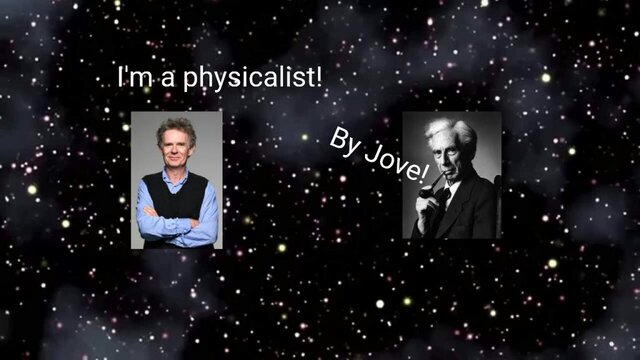smcder
Right - it's circular. And we don't yet
know that it does not emerge or that it is not the intrinsic nature of mind. As I've said, it's good to pursue many options - but the problem with CR as you present it, is there is never going to be a way to show that it is true? Do you see that? You can always just say, no you are seeing the mental because everything is mental.
Again, again ... what is it that we know about matter that it can't be conscious?
constance
On the other hand, what do we know about matter that supports the notion that it is conscious?
I think some of the articles you recently posted
support the idea - they make a coherent argument or story of it:
The Transition to Minimal Consciousness through the Evolution of Associative Learning
Abstract
The minimal state of consciousness is sentience. This includes any phenomenal sensory experience – exteroceptive, such as vision and olfaction; interoceptive, such as pain and hunger; or proprioceptive, such as the sense of bodily position and movement. We propose
unlimited associative learning (UAL) as the marker of the
evolutionary transition to minimal consciousness (or sentience), its phylogenetically earliest sustainable manifestation and the driver of its evolution. We define and describe UAL at the behavioral and functional level and argue that the structural-anatomical implementations of this mode of learning in different taxa entail subjective feelings (sentience). We end with a discussion of the implications of our proposal for the distribution of consciousness in the animal kingdom, suggesting testable predictions, and revisiting the ongoing debate about the function of minimal consciousness in light of our approach.
smcder more so in that the first two paragraphs in the introduction tie this in with the transition from matter to life:
Introduction
One way to study a major evolutionary change, such as the transition to consciousness, would be to discover a trait that is necessary for the transition. This would make it possible to identify the evolutionarily most elementary form of consciousness that is free of the baggage of later-evolved structures and processes.
The transition from inanimate matter to life shares interesting conceptual parallels with the emergence of consciousness. We use the approach of the Hungarian theoretical chemist
Gánti (1975) and
Gánti et al. (2003) to the study of minimal life as a heuristic for the study of the evolutionary transition to consciousness (for a detailed discussion of this heuristics see
Ginsburg and Jablonka, 2015).
Gánti started by compiling a list of properties that jointly characterize minimal life and constructed a toy model (the chemoton) instantiating them. He suggested that one of the capacities of a minimal life system could be used as a marker of the evolutionary transition to sustainable minimal life. His specific suggestion, which was later sharpened and developed by
Szathmáry and Maynard Smith (1995), was that the capacity for
unlimited heredity marks the transition from non-life to sustainable life: only a system capable of producing hereditary variants that far exceed the number of potential challenges it is likely to face would permit long-term persistence of traits and cumulative evolution. Moreover, a system enabling unlimited heredity requires that the information-carrying subsystem is maintained by self-sustaining metabolic dynamics enclosed by a membrane – features like those exhibited by a proto-cell, an acknowledged minimal living system. Hence, once a transition marker is identified it allows the “reverse engineering” of the system that enables it.
Is that finally persuasive? No.
I agree with Bitbol that the stance to take is to put consciousness as primary
methodologically and
existentially.
Finally, I think
I have to take into account the evidence - for example that Dean Radin has collected:
http://deanradin.com/evidence/evidence.htm
That does not fit into the physic(s)alism that we understand today and consider what that might mean for physicalism, HCT, CR, etc etc. For me, that is evidence that mind is non local and non physical as we currently understand it.
Finally, finally I think we draw consequences from the idea that mind is matter that aren't warranted - the primary one being mind is "nothing but" matter - when matter, as
@Soupie has note, may be quite sufficiently ethereal to address any possible concern.
@Constance
What is your sense of the relationship of mind to matter?


 pg. 136-137). Biochemistry with auto-catalytic and cross-catalytic processes creates far-from-equilibrium steady states that by virtue of being unstable, are therefore sensitive to the boundary conditions in which they exist, and therefore confer adaptability to changing environmental conditions. Crash goes the reductionistic freight train! Complexity theory is the foundational science of biology, and should be for medicine if it is to be redeemed from it's current abandonment of healing for pharmacologic symptom suppression."
pg. 136-137). Biochemistry with auto-catalytic and cross-catalytic processes creates far-from-equilibrium steady states that by virtue of being unstable, are therefore sensitive to the boundary conditions in which they exist, and therefore confer adaptability to changing environmental conditions. Crash goes the reductionistic freight train! Complexity theory is the foundational science of biology, and should be for medicine if it is to be redeemed from it's current abandonment of healing for pharmacologic symptom suppression."